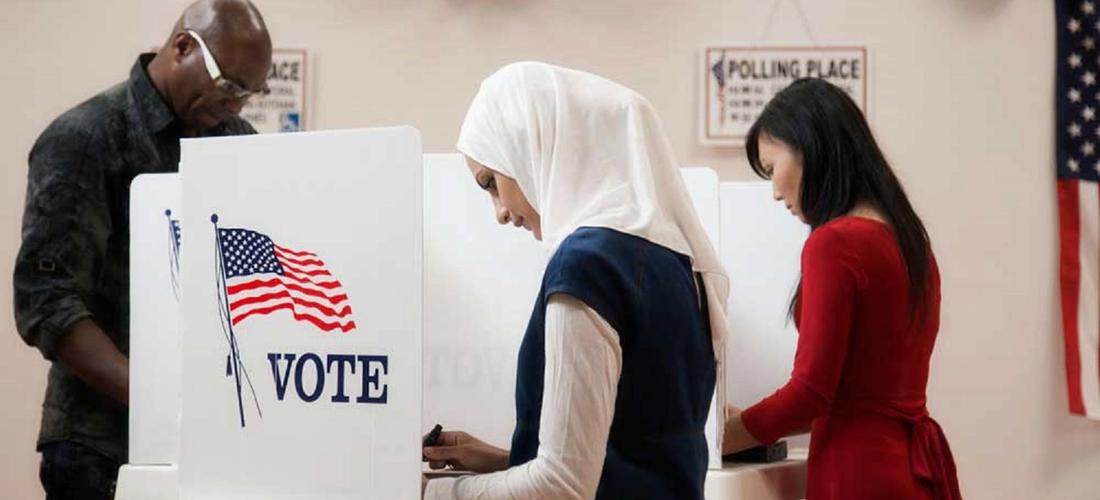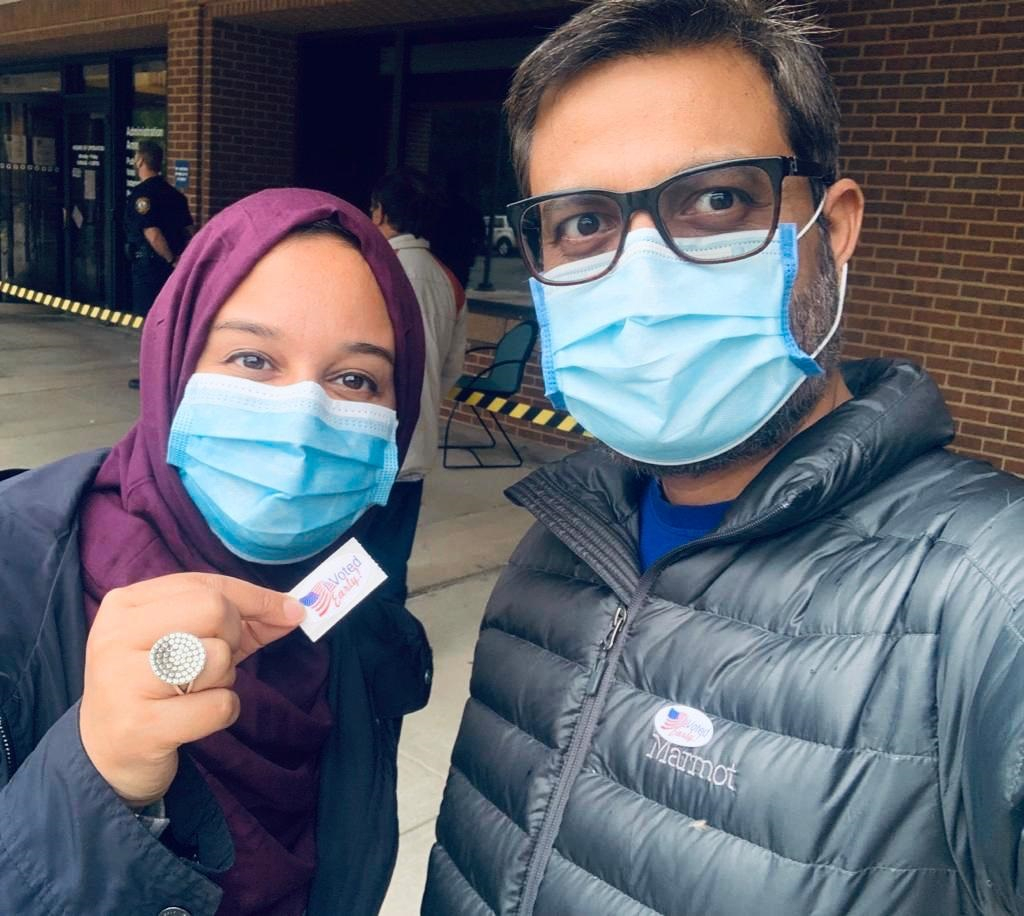What's Your Voting Plan? And Why, As a Muslim, You Should Vote
Current Events
|
Oct 22, 2020
|
6 MIN READ

Image source: Institute on Social Policy and Understanding
If there ever was a year to have a voting plan, 2020 is IT! The stakes are too high, there is an ongoing global pandemic, possible mail-in voting tampering in some places and voter records are being purged for a variety of reasons across the country. So yes, it requires a little thought and planning.
But, it’s well worth it.
At our last weekly company-wide meeting, our COO Ahmed gave a little talk about making time to vote, whether we were planning to do early-voting or vote on November 3rd. Many in our company talked about how they plan to vote but haven’t done it yet and plan to “get to it.” We’ve already voted in my household – five out of six of us who are eligible to vote have cast their ballot. My elderly in-laws who have been staying home due to COVID restrictions and precautions, requested and filled out mail-in ballots that my husband and I then dropped off for them instead of mailing it in. (You know, just to be extra safe.)
My husband and I voted in person early, and the last legal voter in our home – our autistic 20-year-old son – also has his mail-in ballot here at home. We will prepare his voter choice guide for him and help him cast his ballot this weekend, which I’ll then also drop off. As you can see, voting takes careful planning in our home, with elderly and disabled voters who want to do their civic duty.
If we can pull it off, so can you.
From years of covering how American Muslims engage in voting, I’ve noted two things that sometimes stop us from voting: Apathy or lack of planning (coupled with a “meh, my vote is not going to do anything” kind of attitude) or belief that as Muslims, we should not vote for candidates supporting things we deem are un-Islamic (which honestly could be argued about most American political candidates). So, let’s talk about both.
Should I, as a Muslim, Vote?
In a word? Yes.
Ok, so what’s my authority to say this? Really, I don’t have any sort of Islamic authority behind me. But in all my journalistic years of exploring this question, I’ve seen enough scholars, religious leaders, activists and laypersons lay out pretty solid explanations for why we should engage in the political process of voting.
In this editorial that I edited and published a few years back over at Altmuslim, Asifa Quraishi-Landes, a law professor at the University of Wisconsin, argues that it is incumbent upon Americans to vote even if the issues and candidates at stake don’t necessarily align with Islamic principles:
“Knowing this, the question of what sharia demands of American Muslim voters becomes quite simple. If the first Islamic responsibility of a ruler is to serve the public good, and if in a democracy the “ruler” is all of us, then the only question on my mind when I go to the voting booth in the United States is: 'What will serve the American public good?' (Notice that this is a very different question than “How do I live my life as a Muslim?” That is the business of fiqh personal law, not siyasa state law.)
"This same question should be on the minds of all American Muslims who cast a ballot, or vote in Congress, or judge a case.
"Most importantly, this is not a selling out of our Islamic values. As USC professor and Islamic scholar Sherman Jackson points out in The Islamic Secular, there are all sorts of important societal rules that don’t come from scripture, but that does not make them any less Islamic. For example, the Quran and Sunnah tell us to take care of nature, the poor and the sick, but they don’t tell us what level of emissions standards to set, what the minimum wage should be, or how to get everyone adequate health care.”
For more statements from Islamic scholars on why we should be voting, check out this detailed PDF compiled by Ahmed Bedier for United Voices for America on “Islamic Scholars’ Perspectives on Voting and Elections.”

My husband and I after casting our ballot early and dropping off my in-laws' mail-in ballots.
Making a Plan for Voting
If you haven’t already cast your ballot, you need a plan about how you will be doing it. Many places have hours-long lines even for early voting, which is why having a voting plan in place this year is a good idea. Here are a few things to consider:
1. Who in your household is voting? Are they all registered? (In many states, registration dates have passed, but you can still check here to see if you can register if you haven’t already yet.) Does anyone have a health issue or time issue that impedes them from early voting? Can you all go and early vote together? Depending on everyone’s schedules, make plans to vote when it works for you.
2. Early voting, mail in voting or voting on November 3rd? Which one of these is right for you? Read on to #s 3, 4 and 5!
3. Mail in voting or absentee ballot (whether you actually mail in your ballot or drop it off at one of the legitimate drop off sites in your area) takes a bit of planning. Every state’s rules are different, so do your research (you can start here). You need to fill out a form in advance (as designated by your state) for the ballot to be mailed to you. Then it needs to be mailed in by the designated deadline. OR, you can drop it off after filling it out.
Be sure to STRINGENTLY follow the directions when you do mail-in voting because they will reject your vote if it’s not cast properly. Please note, with the election now less than two weeks away, this option may be too late in most states. Read here for absentee and mail in voting policies that are in effect for 2020.
4. Early voting is also a great option. Find out where the early voting sites are and what the rules are in your area and perhaps do some reconnaissance work to see when the lines are shorter. We were pretty lucky with nonexistent lines. In other places around the country, the wait has been several hours. Check to see when early voting ends in your area.
If the lines are perpetually long, make time in your schedule for it. Make sure your phone is charged so you can listen to some music, or maybe bring a book to read. Catch up on your phone calls. There’s plenty you can do while waiting in line.
5. Voting on November 3rd: Check ahead of time to see where your polling site is, because it may have changed. Check to see what the voting times are, what safety protocols are in place and what you need to bring with you (driver’s license, etc.).
6. If you are helping elderly or disabled people in your family to vote (or are elderly or disabled yourself) and didn’t get around to mail-in or early voting, don’t worry. You have the right to ask poll workers on election day to help an elderly or disabled person vote. Check out this guide for more voting information geared towards elderly or disabled people.
There are ample voter guides out there that go over these rules and guidelines much better than me. Click here to read more.
Listen, I know it’s easier to sit home and not bother. Voting in any election year takes a little bit of effort and this year it’s taking even more effort. You may wonder if your vote will count at all. You may feel like, if you live in a well-defined red or a blue state, that your vote won’t affect the election very much.
But it will. Every vote counts. This is not just the presidential election at state. There are countless state and local elections and ballot initiatives being fought and contested across the country. Elections and governing affect every aspect of our lives – locally and all the way to nationally.
So yes, it’s worth it! As to who to vote for? Well, that's pretty clear to me. :)
Subscribe to be the first to know about new product releases, styling ideas and more.
What products are you interested in?

